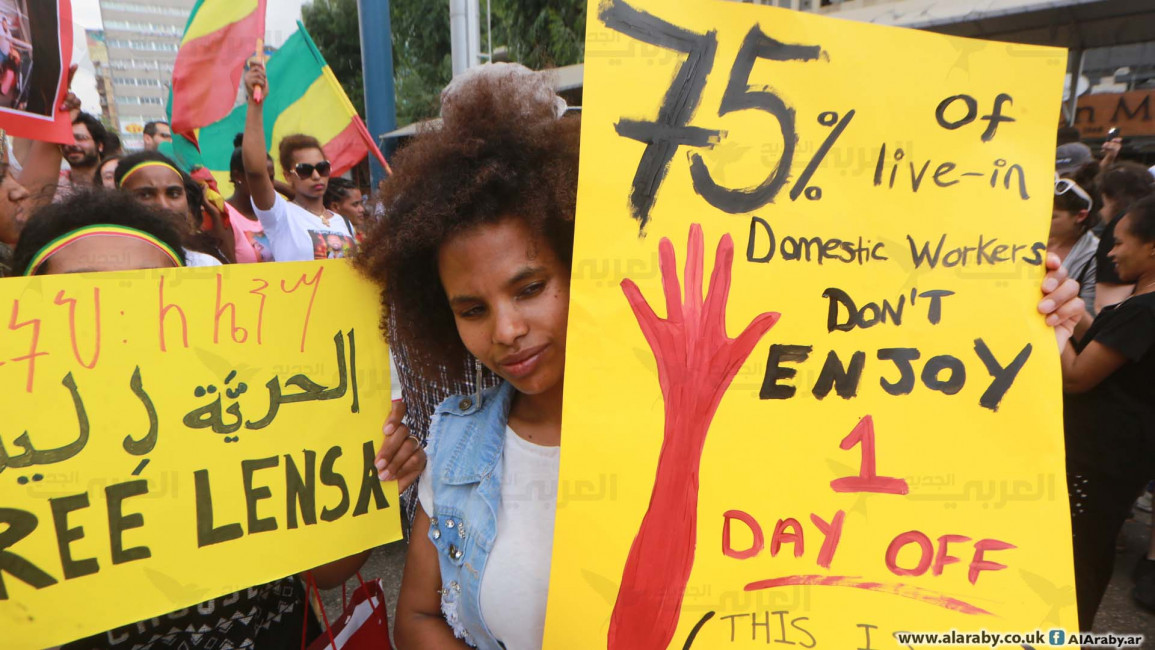Abolish Kafala: Lebanon domestic workers protest 'slave like' conditions
Abolish Kafala: Lebanon domestic workers protest 'slave like' conditions
Migrant domestic workers in Lebanon took to the streets on International Domestic Workers' Day to demand the end of the unjust Kafala system and call for recognition of their rights
2 min read
Migrant workers gather in Beirut to protest inhumane conditions [Hussein Baydoun]
Migrant domestic workers in Lebanon took to the streets on International Domestic Workers' Day on Sunday, to demand the end of the unjust Kafala system which strips workers of basic rights, trapping them by prohibiting them from changing or leaving jobs without their employer's permission.
This year marks the ninth year of organised domestic workers' protest in Lebanon, but also a year which witnessed horrific injustices against such labourers.
According to figures disclosed to the IRIN news agency by Lebanon's General Security department, migrant domestic workers are dying at a rate of two per week in Lebanon.
"Although nine years have passed, we are still voicing the same demands, with no visible progress or change. Except for one: the increasing number of violations and abuses faced by domestic workers," said the call to protest circulated by the human rights and community groups who organised the demonstration, including the Knowledge Workshop, Amnesty International and KAFA.
Read more: Meeting Lebanon's slaves
Under the Kafala - meaning sponsorship - system, workers are tied to one employer and cannot change or quit jobs, let alone leave the country, without the employer's permission. Critics label it as a modern version of slavery.
Employers can also cancel the maid's residency visa, which forces her to either stay in the country illegally or face deportation, which often means they must spend time in prison before being transported out of the country.
These workers are also devoid of labour rights, and therefore have no right to a minimum wage or days off. Their lack of rights means that abuse at the hands of their employers - including underpayment, overwork, restriction of movement, lack of food and emotional abuse - is rife.
The demonstrators put forward four demands, firstly to replace kafala with a new and fair system that would allow workers to resign from their jobs and stay in the country until they find new employment.
Secondly, to end administrative detention of domestic workers, which prevents access to justice for victims of abuse.
Thirdly, closer monitoring of recruitment agencies and just punishment for abusive employers. Lastly, ratification of the ILO Convention No. 189, which grants migrant domestic workers fair rights, and which Lebanon is yet to sign.
"We march against violence, against oppression, against discrimination, and against exploitation," the statement added.
This year marks the ninth year of organised domestic workers' protest in Lebanon, but also a year which witnessed horrific injustices against such labourers.
According to figures disclosed to the IRIN news agency by Lebanon's General Security department, migrant domestic workers are dying at a rate of two per week in Lebanon.
"Although nine years have passed, we are still voicing the same demands, with no visible progress or change. Except for one: the increasing number of violations and abuses faced by domestic workers," said the call to protest circulated by the human rights and community groups who organised the demonstration, including the Knowledge Workshop, Amnesty International and KAFA.
Read more: Meeting Lebanon's slaves
Under the Kafala - meaning sponsorship - system, workers are tied to one employer and cannot change or quit jobs, let alone leave the country, without the employer's permission. Critics label it as a modern version of slavery.
Twitter Post
|
Employers can also cancel the maid's residency visa, which forces her to either stay in the country illegally or face deportation, which often means they must spend time in prison before being transported out of the country.
These workers are also devoid of labour rights, and therefore have no right to a minimum wage or days off. Their lack of rights means that abuse at the hands of their employers - including underpayment, overwork, restriction of movement, lack of food and emotional abuse - is rife.
The demonstrators put forward four demands, firstly to replace kafala with a new and fair system that would allow workers to resign from their jobs and stay in the country until they find new employment.
Secondly, to end administrative detention of domestic workers, which prevents access to justice for victims of abuse.
Thirdly, closer monitoring of recruitment agencies and just punishment for abusive employers. Lastly, ratification of the ILO Convention No. 189, which grants migrant domestic workers fair rights, and which Lebanon is yet to sign.
"We march against violence, against oppression, against discrimination, and against exploitation," the statement added.



